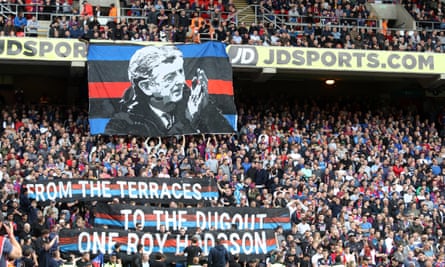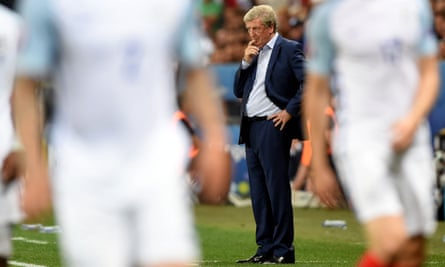“It was a totally different world of football to what we know today and you can’t really make comparisons,” Roy Hodgson said last week. “I get lots of letters from people who, like myself, have been watching the club for 50, 60, 70 years and that’s the type of background we have. It’s nice that you can relate to them.”
Almost seven decades since Hodgson attended his first game at Selhurst Park, Crystal Palace’s home fixture against Arsenal on Wednesday will be a significant moment in his life. The man who grew up around the corner in the same house as Steve Kember – another future Palace manager – and went on to take charge of teams in Sweden, Switzerland and at San Siro among many others before landing the England job will wave goodbye to his home town club.
After uncertainty about whether the 73-year-old would continue following four years characterised by stability, Tuesday’s confirmation of his departure means Palace supporters have an opportunity to pay a fitting tribute to a Croydon legend.
Kember – whose father was the conductor on the bus driven by Hodgson’s Newcastle-supporting father, Bill, and lived in the downstairs flat of a London transport property on Sydenham Road – remembers asking his old friend to coach Park Hill United’s under-11s in the late 1960s. “He hasn’t really looked back since,” he said when Hodgson became England manager in 2012.
Had Hodgson followed his original plan and retired from frontline management five years earlier when his contract with Finland ended a few months after he had celebrated his 60th birthday, he may never have had the chance to manage his country as well as his home town club.
By then Hodgson, who had trials at Selhurst Park before moving into non-league football and taking up coaching at the age of 21, had made a name for himself on the global stage. Along with Bobby Houghton – another former classmate at John Ruskin grammar – Hodgson established himself as one of Sweden’s most successful managers, winning the league with unfashionable Halmstad in his first season in 1976 before managing Malmö to five successive titles during the 1980s.

A spell as Switzerland manager when the team reached third in the Fifa rankings led Internazionale to appoint him in 1995 and he left two years later having guided them to the Uefa Cup final. Hodgson returned to San Siro as a caretaker manager after departing Blackburn, where he had an initially successful stint and finished sixth in the Premier League in his first season, and Inter’s offer to become director of football in 2007 held real attraction for a man whose reputation in his own country was not as established as it was in Europe at that stage.
But Hodgson, who possesses a stubborn streak and a strong desire to prove people wrong, accepted the chance to take over at Fulham a few days after Christmas despite the club having won two Premier League games. Within three years Fulham had made it to the Uefa Cup final, where they were beaten by Atlético Madrid, having seen off Juventus in a thrilling comeback under the lights at Craven Cottage.
“I am really pleased I didn’t go down that route,” Hodgson said this year. “It means a long period of my coaching life has taken place here in London, where I suppose you could argue I belong because it’s where it all started.”

Not every move has been so successful. Liverpool supporters are still haunted by the signing of Christian Poulsen and a League Cup defeat by League Two strugglers Northampton during Hodgson’s brief stay, and his England tenure was defined by the defeat by Iceland in the last 16 of Euro 2016 after he and his erstwhile assistant Ray Lewington took a boat trip down the River Seine rather than scouting their next opponents.
But Hodgson, who had guided to West Bromwich to 11th- and 10th-placed finishes before he was appointed by the Football Association a few months before Euro 2012 after Fabio Capello’s resignation, always acted with great dignity in often testing circumstances that only previous England managers can probably understand.
Perhaps relieved to no longer have to dodge persistent questions about his future, Hodgson seemed much more relaxed during the press conference held to confirm his intentions on Tuesday. He plans to spend more time travelling and with his wife, Sheila, as they prepare to celebrate their 50th wedding anniversary this year.
Asked whether this really was the end, Hodgson couldn’t resist leaving the door slightly ajar. “One never knows,” he said. “It is a dangerous thing to do when you still feel good about yourself to start making bold statements about retirement. I am certainly not leaving Crystal Palace with the idea of putting myself back on the market for another job.
“I really am stepping away from football for a while, but who knows what the future will be? It is a never-say-never moment. I’ve seen so many people retire with all the fanfare blazing, only to surface again somewhere in a fairly short period of time. I’d prefer not to do that.”
Comments (…)
Sign in or create your Guardian account to join the discussion